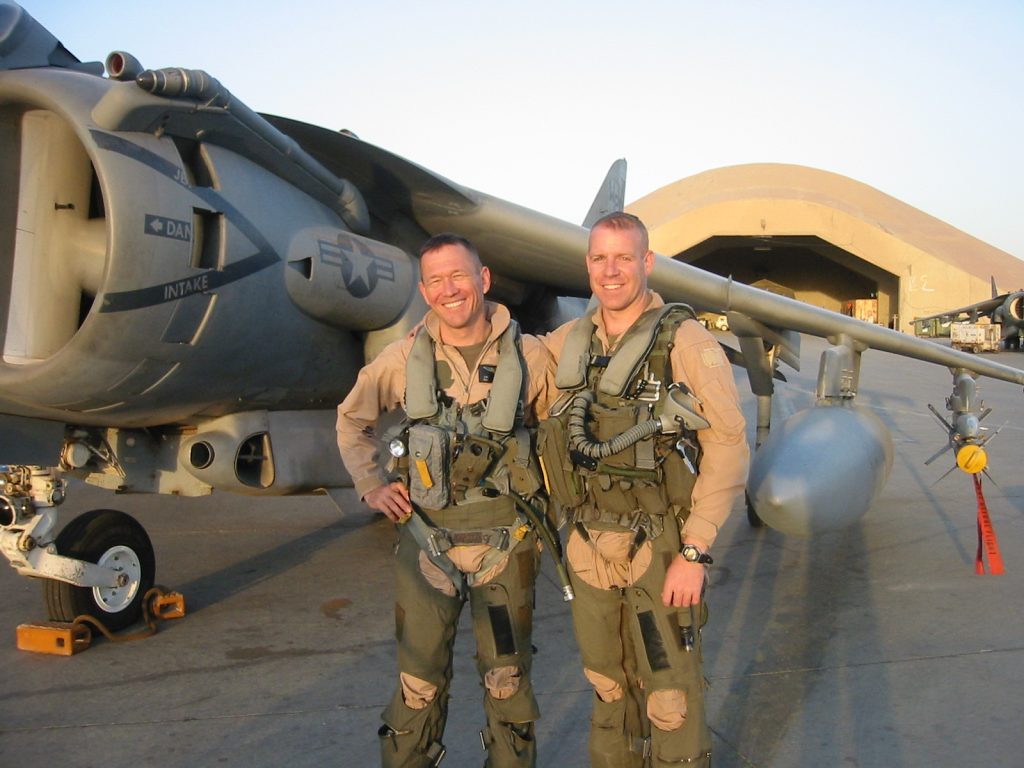
Lt. Gen. Jon M. Davis, above left, experienced plenty of exhilarating moments during his career in the U.S. Marine Corps, launching in his Harrier jump-jet from amphibious carriers and from austere forest roads in Germany. Commanding the Marine Corps Aviation Weapons School, he flew with and taught pilots the advanced tactics they needed to win the Cold War and support the Marines on the ground.
“You have to be disciplined and precise in all you do in Marine aviation — especially in a single-seat jet strike fighter,” says Davis, who graduated from Allegheny in 1980 with an economics degree.
During his years as a military aviator, Davis never had to eject from his aircraft — and finished his career mishap free. “Not in over 4,500 hours of military flying,” he says.
In July 2017, Davis, whose call sign was “Dog,” retired after 37 years in the Marines, most recently as the Pentagon-based deputy commandant for aviation, a post he had held since 2014. The job entailed making sure the Marines’ 1,300 aircraft were equipped and prepared to support 47,000 combat-ready Leathernecks.
What does he consider the biggest difference between his first flight as a Marine aviator and his final flight this past summer from Marine Corps Air Station Cherry Point in North Carolina? “The equipment, training, and standards we have now is so far superior to what we had back then when I was here as a lieutenant,” Davis says.
While Davis and his wife, Carol VanWhy ’83, will continue to live in Virginia, he has joined the Allegheny College Board of Trustees as of Oct. 1. “I want to ensure Allegheny grows, and more importantly, that it produces students with the skills they need to be successful leaders, thinkers, and doers to keep our nation strong,” he says.

Jon and Carol Davis following a Marine Corps marathon run.
Some of Davis’ fellow Phi Delta Theta fraternity members — including Allegheny Marines, Col. (Ret.) Medio Monti ’79, Lt. Col. Steve Held ’80, and Lt. Col. Lloyd Hamashin ’81— attended his retirement ceremony in July at the U.S. Marine Corps Barracks in Washington, D.C. The group also included David “Chip” Seamans ’80, John Brautigam ’80, Lloyd Segan ’80, Dr. Steve Schwartz ’80, Brian Krzykowski ’80, and Bob VanWhy ’80. Davis’ father-in-law Al VanWhy ’54 and Davis’ sister Jodi Miller ’86 also attended.
Davis mentioned Allegheny often during his farewell address.
He credits his college education with providing the disciplined academic background he needed to succeed in the Marines. “Allegheny’s emphasis on writing, speaking and academic standards helped me advance through the good times — and more importantly, through the tough times. Jay Luvaas, Paul Zolbrod, Earl Adams, and Robert Cupper come to mind as professors who challenged me, cut me no slack, but encouraged me to apply myself.”
Among his most memorable moments in the service was being an exchange pilot with Great Britain’s Royal Air Force and being stationed at a North Atlantic Treaty Organization base near East Germany during the Cold War, he says. He considers another major career highlight leading the Marine Corps Aviation Weapons and Tactics School during the Iraq War. “It was a very dynamic time and I was very proud of how we adapted our tactics and training to meet the threat and support the Marines,” says Davis.
Davis also served as the deputy commander of network warfare from 2006 to 2008 and again as the deputy commander to United States Cyber Command from 2012 to 2014. “Cyberspace is another domain in which we must protect our national interest,” he says. “We have some deep-seated problems but also opportunities. We need to focus on making our networks resilient and how to fight through problems while operating. We need to improve how we train and focus on standards.”
As for the state of the world, Davis says: “I think we are in a period of great geopolitical instability. We will need strong alliances, a strong economy and a strong military commitment to lead with principle internationally.”
Besides serving Allegheny as a trustee, Davis says his “retirement” plans include spending more time with family, giving back to his community and country as a volunteer, pursuing some business opportunities in technology and aviation, flying his experimental airplane, fly fishing, heli-skiing, and hiking the Pacific Crest Trail with his wife, Carol.
In typical fashion, Davis chose to leave his formal retirement ceremony to the strains of Led Zeppelin’s “Black Dog.” But before they could complete their march out, Carol ordered the music changed to Etta James’ “At Last.”
Semper Fidelis!